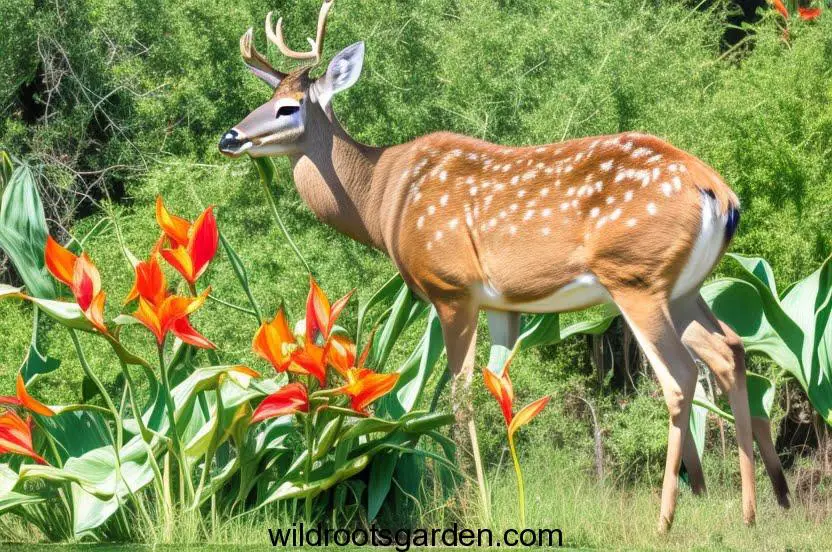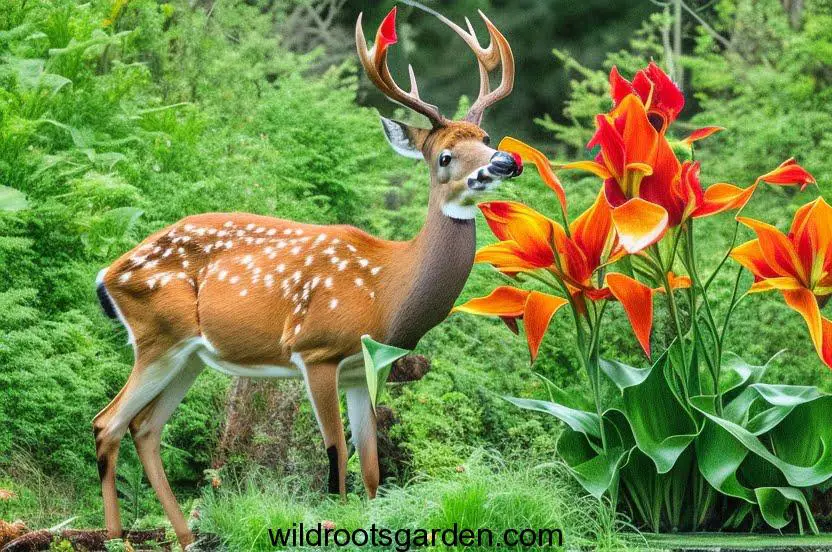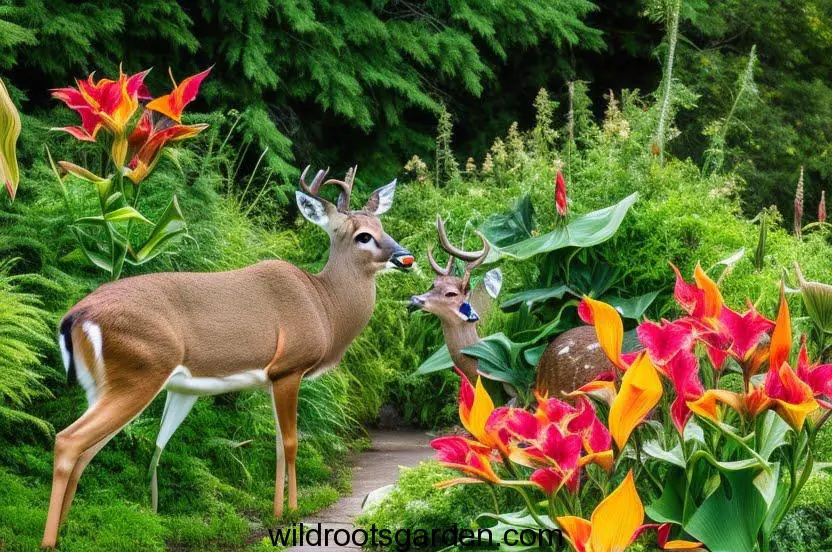Will Deer Eat Canna Lilies? Many garden enthusiasts choose canna lilies since they are colorful and lovely flowering plants. These plants are well-liked for gardens and landscapes because of their gorgeous blossoms and luxuriant foliage. The question of whether deer would eat canna lilies, though, is one that many gardeners worry about. We will delve into the subject and examine the interaction between deer and canna lilies in this post, offering insightful information and helpful advice for safeguarding your prized plants.

Deer Feeding Habits
Since they are herbivores, deer eat a variety of foods like grass, leaves, twigs, fruits, and even flowers. They can recognize and locate a wide variety of plant types thanks to their excellent senses of smell and taste. Although deer mostly eat grass, their feeding patterns might change based on the food sources that are available and the region in which they live.
Do Deer Eat Canna Lilies?
Whether deer consume canna lilies is a complex question. Canna lilies aren’t typically on a deer’s favorite menu, despite the fact that they are notorious for being voracious eaters and capable of harming many garden plants. This is due to the presence of alkaloids in canna lilies, which are bitter substances found in the plant naturally. Deer are put off from eating canna lilies by these alkaloids, which render the plants tasteless.
Yet, it’s crucial to remember that deer may turn to eating canna lilies as a last choice in times of food scarcity or harsh environmental conditions. However, there is no assurance that all deer will stay away from canna lilies because deer feeding habits can vary depending on the region and individual preferences.
Factors That Influence Deer Feeding Behavior
Several factors can influence whether or not deer will eat canna lilies. These include:
- Food Availability: When food sources are limited, deer may be more likely to explore new plants, including canna lilies.
- Environmental Conditions: Harsh weather conditions or drought can impact deer’s usual food sources, leading them to search for alternative options.
- Deer Population Density: Areas with a high deer population may experience increased pressure on available food sources, increasing the likelihood of deer consuming canna lilies.

Protecting Canna Lilies from Deer
To safeguard your canna lilies from deer damage, consider employing the following strategies:
Natural Repellents for Deer
Several natural repellents can be effective in deterring deer from consuming canna lilies. These include:
- Predator Urine: The scent of predator urine, such as coyote or wolf urine, can create the impression of a threat, discouraging deer from approaching.
- Strong Odors: Certain strong-smelling substances like garlic, onions, and rotten eggs can repel deer due to their offensive scent.
Physical Barriers and Deterrents
Physical barriers and deterrents can be highly effective in preventing deer access to your canna lilies. Some options to consider are:

- Fences: Install a sturdy fence around your garden or individual plants to create a physical barrier that deer cannot easily breach.
- Netting: Covering your canna lilies with netting can provide protection while still allowing sunlight and air circulation.
Companion Planting as a Strategy
Companion planting involves strategically placing plants that repel deer or mask the scent of attractive plants. Consider incorporating the following plants as companions to your canna lilies:
- Lavender: Deer find the scent of lavender unappealing and tend to avoid areas where it is planted.
- Marigolds: Marigolds produce a strong scent that can help deter deer from approaching nearby plants.
Other Tips for Deer Management in the Garden
In addition to the specific strategies mentioned above, here are some general tips for managing deer in your garden:

- Garden Design: Opt for plants that are less appealing to deer in your overall garden design, focusing on varieties they are less likely to consume.
- Deer-Resistant Plants: Incorporate deer-resistant plants alongside your canna lilies to reduce the likelihood of deer damage.
- Motion-Activated Sprinklers: Install motion-activated sprinklers that release water when deer approach, startling them and deterring them from entering the area.
- Regular Garden Maintenance: Keeping your garden tidy and free from debris can discourage deer from seeking shelter in your yard.
Frequently Asked Questions (FAQs)
Q: Are canna lilies toxic to deer?
A: No, canna lilies are not toxic to deer. However, their natural bitterness makes them unappealing to these animals.
Q: Can I use commercial deer repellents on canna lilies?
A: Yes, there are many commercial deer repellents available that can be used on canna lilies. Follow the product instructions carefully for the best results.
Q: Will planting canna lilies near other deer-resistant plants help protect them?
A: Yes, planting canna lilies alongside other deer-resistant plants can provide an added layer of protection by creating a less attractive environment for deer.
Q: How tall should a fence be to deter deer?
A: To deter deer, a fence should be at least 8 feet tall. However, local regulations and aesthetic considerations may impact the height you can install.
Q: Can deer adapt to eating canna lilies over time?
A: While it is possible for deer to adapt their feeding preferences, canna lilies’ natural bitterness generally discourages them from making it a preferred food source.
Conclusion
Canna lilies are not usually a deer’s first choice, however, they may occasionally nibble on them. Canna lilies’ inherent bitterness discourages deer from eating them, offering some kind of defense. Nonetheless, if alternative food sources are limited in some circumstances, deer may turn to consuming canna lilies. You may dramatically lower the chance of deer encounters by putting in place efficient deterrents, such as natural repellents, physical barriers, and companion planting.

